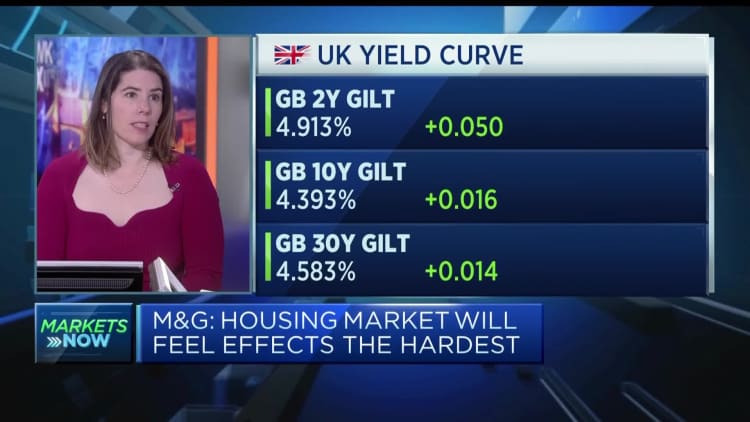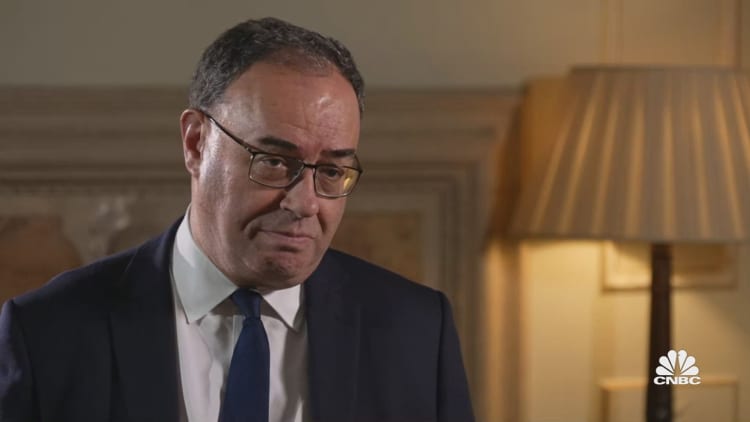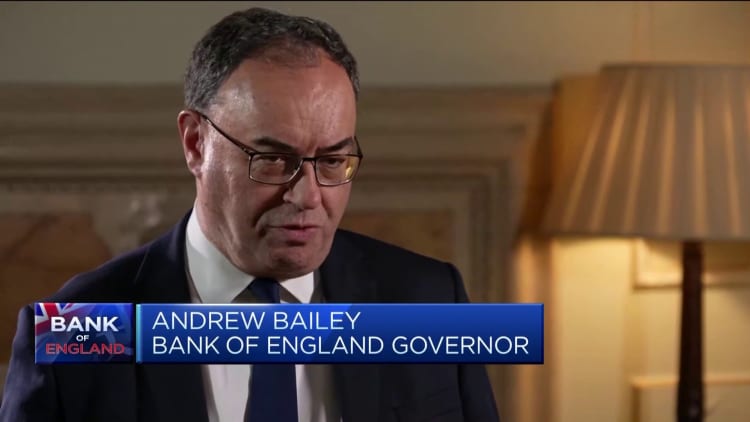A member of the public walks through heavy rain near the Bank of England in May 2023.
Dan Kitwood | Getty Images News | Getty Images
The Bank of England’s losses on bonds bought to shore up the U.K. economy after the financial crisis will be “materially higher than projected until the middle of the decade,” according to Deutsche Bank.
In late July, the central bank estimated that it would require the U.K. Treasury to backstop £150 billion ($189 billion) of losses on its asset purchase facility (APF).
The program ran from 2009 to 2022 and was designed to improve financing conditions for companies hit by the 2008 financial crisis. It saw the BOE accrue £895 billion worth of bond holdings while interest rates were historically low.
However, the central bank began unwinding that position late last year, initially through halting reinvestments of maturing assets and then by actively selling the bonds at a projected pace of £80 billion per year from October 2022.
Both the Treasury and the BOE knew when the AFP was implemented that its early profits (£123.8 billion as of September last year) would become losses as interest rates rose.
However, the pace at which the central bank has had to tighten monetary policy in a bid to tame inflation means the costs have risen more sharply than anticipated. Higher rates have driven down the value of the purchased government bonds — known as gilts — just as the BOE began selling them at a loss.

July’s public finances data showed that the Treasury transferred £14.3 billion over the month to the Bank of England to cover the losses on its quantitative easing program, £5.4 billion above the figure projected by the independent Office for Budget Responsibility (OBR) in March.
Deutsche Bank Senior Economist Sanjay Raja noted that a total of £30 billion has so far moved from the Treasury to the central bank since September, and the indemnities are likely to continue to run well above the government’s forecasts for two reasons.

“First, interest rates have risen far above levels assumed in the fiscal watchdog’s spring forecasts. And second, gilt prices have fallen further – particularly in the longer end of the curve, resulting in further valuation losses as the Bank actively unwinds the APF through active gilt sales,” Raja explained in a research note Friday.
The Bank of England has hiked rates at 14 consecutive monetary policy meetings, taking its benchmark interest rate from 0.1% in late 2021 to a 15-year high of 5.25%. The market broadly expects a 15th hike to 5.5% at the next Monetary Policy Committee meeting.
A two-fold hit
Imogen Bachra, head of U.K. rates strategy at NatWest, said the hit to public finances — and therefore to the government’s coffers — is two-fold.
“On one hand, QT loses money because the Treasury takes the BoE’s losses when gilts are sold at a lower price than paid. This was expected: the BoE bought bonds in a falling rate environment due to disinflation, while ‘success’ was to be defined by reflation and so higher rates,” Bachra said in a recent note.
“On the other hand, though, while QE gilts are not sold, the BoE pays Bank Rate on the ~£900bn reserves it created to buy them. The higher Bank Rate rises, the more costly this interest expense becomes.”
This could throw a wrench into the government’s ability to offer public spending or tax-cutting pledges ahead of a general election slated for 2024.
Any profits the Bank of England generates on printing banknotes or buying and selling bonds, beyond its required capital buffers, is passed to the Treasury to be repurposed for public spending.
‘Ballooning cost’
Deutsche Bank assessed both the net interest costs likely to be paid on central bank reserves and the deteriorating value of the AFP bonds when the BOE crystallizes the “mark-to-market” losses by selling them or redeeming them.

Raja concluded that the cost to the Treasury of indemnifying the central bank over the next two fiscal years will be around £23 billion higher than the OBR forecast in March, coming in at £48.7 billion for the current fiscal year and £38.1 billion next year before falling sharply across the following two years as the Bank rate falls and the overall size of the AFP stock is depleted.
“The good news is that with government revenues running a lot stronger — due to a stronger economy these last few months — overall borrowing will still likely undershoot the OBR’s forecasts heading into the autumn fiscal statement, masking the ballooning cost of the Bank’s APF bill.”

